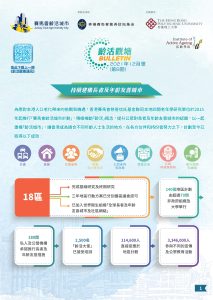Kwun Tong Age-friendly Bulletin 2021 (齡活觀塘 Bulletin 2021)



To raise awareness of age-friendly initiatives in Kwun Tong District the Institute of Active Ageing at the Hong Kong Polytechnic University, through its role as the Professional Support Team of the Jockey Club Age-Friendly City (JCAFC) Project published three issues of the Kwun Tong Age-Friendly Bulletin between April and December 2021. Targeted towards older persons as well as age-friendly stakeholders, components of the Bulletin include:
Website: https://www.jcafc-port.hk/en/
Main target group: Older people in general
Other target group(s): The stakeholders who would contribute to the promotion of age-friendliness in the district: District Council, NGOs which provide services to older adults, related government departments e.g. Highways Department, Leisure and Cultural Services Department, etc. General public: residents of public housing estates, elderly service recipients
Sector(s): Health, Housing, Information and communication, Transportation, Urban development
Desired outcome for older people:
Build and maintain relationships